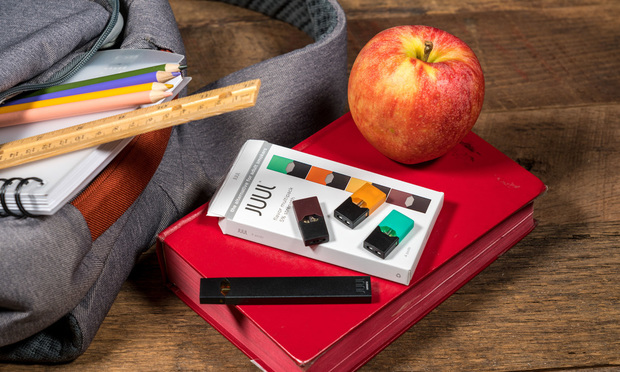School Districts Sue Juul Over Marketing E-Cigs to Their Students
The lawsuits are the first to be filed by school districts but join dozens of other lawsuits alleging Juul's marketing caused children to become addicted to its products.
October 07, 2019 at 06:23 PM
5 minute read
Three school districts in Missouri, Kansas and New York have sued Juul Labs Inc. over increased costs associated with a rise in electronic cigarette use at its schools.
A suit filed Oct. 4 in the U.S. District Court for the Eastern District of Missouri is the first brought by a school district but joins dozens of other lawsuits alleging Juul's marketing caused children to become addicted to its products. Two others, brought on behalf of school districts in New York and Kansas, were filed on Monday.
"JUUL's reckless actions have forced schools to spend their already limited funding to battle the nicotine addiction epidemic it reignited," said Joseph VanZandt, of Beasley, Allen, Crow, Methvin, Portis & Miles in Montgomery, Alabama. "This lawsuit puts JUUL and other vaping manufacturers on notice that they cannot unleash such an immense threat to the public's health and safety with impunity."
In the first suit, Francis Howell School District, which is just outside St. Louis, said tobacco-related infractions have risen each year at its schools since 2015, including at some elementary schools, because of Juul's products, leading to more time spent on disciplinary actions and money spent on smoking cessation programs and additional staff.
"Plaintiff has been forced to expend significant resources combating this public nuisance of defendant's creation and will need to continue expending such resources as the epidemic shows no signs of abating on its own," the suit says.
The suit seeks an unspecified amount of damages, including punitive damages, against Juul under the U.S. Racketeer Influenced Corrupt Organizations Act and common law claims of public nuisance and gross negligence, among other things.
The two additional lawsuits filed on Monday, one by the Three Village Central School District on New York's Long Island and the other by Olathe Public Schools, a Kansas school district near Kansas City, Kansas, made the same claims.
Wagstaff & Cartmell and Beasley Allen brought the lawsuits, along with local counsel.
"Our product has always only been intended to be a viable alternative for the one billion current adult smokers in the world," Juul spokesman Ted Kwong said in an emailed statement. "We have never marketed to youth and do not want any non-nicotine users to try our products. We have launched an aggressive action plan to combat underage use as it is antithetical to our mission."
That action plan, he wrote, includes advocating for legislation to raise the age to buy tobacco products to 21, halting sales of "non-tobacco and non-menthol based flavored Juul pods to our traditional retail store partners," enhancing an online and in-store age verification process, and shutting down Facebook and Instagram accounts.
Juul faces more than 55 lawsuits, coordinated last week into multidistrict litigation before U.S. District Judge William Orrick of the Northern District of California. Those cases are lawsuits by individuals who claim to have suffered pulmonary disease, seizures and other serious health problems after using Juul's products, and class actions alleging the San Francisco-based company's advertising and marketing misled customers to believe its products did not contain nicotine. Several state attorneys general are investigating Juul, and the state of North Carolina has filed a lawsuit, as did an Illinois county last month, represented by three Chicago firms: Edelson, Hart McLaughlin & Eldridge and RB Law.
The addition of school districts as plaintiffs borrows from the opioid crisis, where more than 2,000 local governments, including cities, counties and school districts, have brought their own lawsuits against drugmakers. According to the lawsuit, schools have installed sensors in bathrooms or removed bathroom doors, banned USB flash drives, and hired more staff to deal with increased use of Juul's products among their students. At least one other school district in Kansas, Goddard Public Schools, voted last month to sue Juul.
Juul also faces increased regulatory pressure from the Food and Drug Administration, which is investigating Juul's marketing to children, and the Federal Trade Commission, which last month launched a probe of six e-cigarette companies including Juul.
In July, Juul executives testified before a U.S. House subcommittee. Last month, Juul announced it would suspend advertising of its products, and its CEO stepped down, replaced by an executive at Altria Group Inc., the parent company of Philip Morris. Last year, Altria purchased a 35% stake in Juul.
Those actions come "too late," according to the Missouri school district's suit, since "Juul's deceptive and illegal conduct had already succeeded in addicting a generation of America's youth to its nicotine products."
Juul's devices look like USB drives and require disposable nicotine cartridges called "JUULpods." The e-cigarettes, heavily advertised on social media platforms, come in various flavors, like cucumber and mango—among the many indications Juul has targeted minors and contributed significantly to a nicotine addiction epidemic sweeping America's youth, according to the Missouri school district's lawsuit.
"Taking a page from big tobacco's playbook, Juul, in concert with its advertising agencies and others, developed a product and marketing strategy that sought to portray its e-cigarette products as trend-setting, stylish and used by the type of people teenagers look up to," the suit says.
Juul used social media, primarily through hashtags and "influencers," to spread the word about its products, the suit says. It also handed out free samples at movie and music events or held "education" programs at schools purportedly to discourage vaping among teens.
Juul even paid $134,000 to sponsor a summer camp in Baltimore, Maryland, according to the suit.
"As part of that sponsorship, Juul would receive data on the camp's participants: kids ranging from grade 3 to 12," the suit says. "What Juul needed data regarding 3rd graders for is known only to Juul, but the possibilities are frightening."
This content has been archived. It is available through our partners, LexisNexis® and Bloomberg Law.
To view this content, please continue to their sites.
Not a Lexis Subscriber?
Subscribe Now
Not a Bloomberg Law Subscriber?
Subscribe Now
NOT FOR REPRINT
© 2025 ALM Global, LLC, All Rights Reserved. Request academic re-use from www.copyright.com. All other uses, submit a request to [email protected]. For more information visit Asset & Logo Licensing.
You Might Like
View All
Apple Files Appeal to DC Circuit Aiming to Intervene in Google Search Monopoly Case
3 minute read
A Plan Is Brewing to Limit Big-Dollar Suits in Georgia—and Lawyers Have Mixed Feelings
10 minute read
Trending Stories
- 1Bar Groups Say IOLA Settlement Protects Civil Litigants' Fund From Future 'Raids'
- 2'Every MAGA Will Buy It:' Elon Musk Featured in Miami Crypto Lawsuit
- 3Pennsylvania Law Schools Are Seeing Double-Digit Boosts in 2025 Applications
- 4Meta’s New Content Guidelines May Result in Increased Defamation Lawsuits Among Users
- 5State Court Rejects Uber's Attempt to Move IP Suit to Latin America
Who Got The Work
J. Brugh Lower of Gibbons has entered an appearance for industrial equipment supplier Devco Corporation in a pending trademark infringement lawsuit. The suit, accusing the defendant of selling knock-off Graco products, was filed Dec. 18 in New Jersey District Court by Rivkin Radler on behalf of Graco Inc. and Graco Minnesota. The case, assigned to U.S. District Judge Zahid N. Quraishi, is 3:24-cv-11294, Graco Inc. et al v. Devco Corporation.
Who Got The Work
Rebecca Maller-Stein and Kent A. Yalowitz of Arnold & Porter Kaye Scholer have entered their appearances for Hanaco Venture Capital and its executives, Lior Prosor and David Frankel, in a pending securities lawsuit. The action, filed on Dec. 24 in New York Southern District Court by Zell, Aron & Co. on behalf of Goldeneye Advisors, accuses the defendants of negligently and fraudulently managing the plaintiff's $1 million investment. The case, assigned to U.S. District Judge Vernon S. Broderick, is 1:24-cv-09918, Goldeneye Advisors, LLC v. Hanaco Venture Capital, Ltd. et al.
Who Got The Work
Attorneys from A&O Shearman has stepped in as defense counsel for Toronto-Dominion Bank and other defendants in a pending securities class action. The suit, filed Dec. 11 in New York Southern District Court by Bleichmar Fonti & Auld, accuses the defendants of concealing the bank's 'pervasive' deficiencies in regards to its compliance with the Bank Secrecy Act and the quality of its anti-money laundering controls. The case, assigned to U.S. District Judge Arun Subramanian, is 1:24-cv-09445, Gonzalez v. The Toronto-Dominion Bank et al.
Who Got The Work
Crown Castle International, a Pennsylvania company providing shared communications infrastructure, has turned to Luke D. Wolf of Gordon Rees Scully Mansukhani to fend off a pending breach-of-contract lawsuit. The court action, filed Nov. 25 in Michigan Eastern District Court by Hooper Hathaway PC on behalf of The Town Residences LLC, accuses Crown Castle of failing to transfer approximately $30,000 in utility payments from T-Mobile in breach of a roof-top lease and assignment agreement. The case, assigned to U.S. District Judge Susan K. Declercq, is 2:24-cv-13131, The Town Residences LLC v. T-Mobile US, Inc. et al.
Who Got The Work
Wilfred P. Coronato and Daniel M. Schwartz of McCarter & English have stepped in as defense counsel to Electrolux Home Products Inc. in a pending product liability lawsuit. The court action, filed Nov. 26 in New York Eastern District Court by Poulos Lopiccolo PC and Nagel Rice LLP on behalf of David Stern, alleges that the defendant's refrigerators’ drawers and shelving repeatedly break and fall apart within months after purchase. The case, assigned to U.S. District Judge Joan M. Azrack, is 2:24-cv-08204, Stern v. Electrolux Home Products, Inc.
Featured Firms
Law Offices of Gary Martin Hays & Associates, P.C.
(470) 294-1674
Law Offices of Mark E. Salomone
(857) 444-6468
Smith & Hassler
(713) 739-1250










